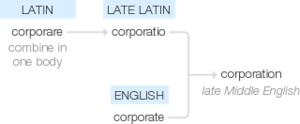Machines: Difference between revisions
From BurnZero
No edit summary |
No edit summary |
||
| Line 1: | Line 1: | ||
[[File:Corporate etymology.png|alt=Corporate etymology|thumb|The origin of the word "Corporation"]] | [[File:Corporate etymology.png|alt=Corporate etymology|thumb|The origin of the word "Corporation"]] | ||
'''A machine is an enclosure which contains | '''A machine is an enclosure which contains independent parts that exert force on each other to produce a desired function. This may be as simple as cogs in a drill press or more complicated like employees working in a [[corporation]].''' | ||
It is the commonality of the parts which define the machine i.e. the majority of parts in a drill press do simple tasks which work together to make holes in things. Whereas in a corporation a collection of people work together to make profit. Machines always have inputs, a function and then based on their efficiency a productive output (internality) and a waste output ( | It is the commonality of the parts which define the machine i.e. the majority of parts in a drill press do simple tasks which work together to make holes in things. Whereas in a corporation a collection of people work together to make profit. Machines always have inputs, a function and then based on their efficiency, a productive output (''internality'') and a waste output (''externality''). | ||
Revision as of 07:39, 12 April 2022
A machine is an enclosure which contains independent parts that exert force on each other to produce a desired function. This may be as simple as cogs in a drill press or more complicated like employees working in a corporation.
It is the commonality of the parts which define the machine i.e. the majority of parts in a drill press do simple tasks which work together to make holes in things. Whereas in a corporation a collection of people work together to make profit. Machines always have inputs, a function and then based on their efficiency, a productive output (internality) and a waste output (externality).
